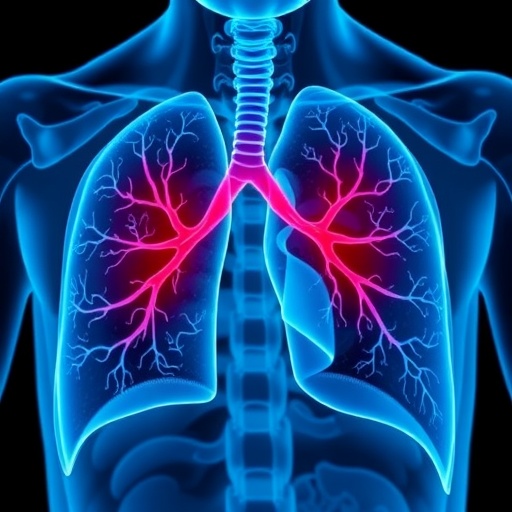In a groundbreaking advancement for the management of advanced non-small cell lung cancer (NSCLC) harboring epidermal growth factor receptor (EGFR) mutations, the addition of ivonescimab—a novel bispecific antibody targeting both programmed cell death protein 1 (PD-1) and vascular endothelial growth factor (VEGF)—to standard chemotherapy regimens has demonstrated a significant improvement in progression-free survival (PFS). This pivotal finding emerges from the global Phase 3 HARMONi trial, which was recently unveiled at the prestigious International Association for the Study of Lung Cancer (IASLC) 2025 World Conference on Lung Cancer (WCLC) held in Barcelona, Spain.
Ivonescimab offers a pioneering therapeutic approach by simultaneously modulating immune checkpoint pathways and angiogenesis, two fundamental mechanisms driving tumor growth and progression in NSCLC. The bispecific nature of this antibody enables it to effectively block PD-1, an immune checkpoint receptor implicated in immune evasion by cancer cells, while also inhibiting VEGF-mediated angiogenesis, a critical factor supporting tumor vascularization and metastasis. The dual blockade provides a multifaceted attack on cancer biology, augmenting the efficacy of cytotoxic chemotherapy agents such as pemetrexed and carboplatin.
The HARMONi trial enrolled 438 patients globally, with a median age of 62 years, all of whom had advanced EGFR-mutant NSCLC with disease progression despite prior exposure to third-generation EGFR tyrosine kinase inhibitors (TKIs). Notably, nearly one-quarter of participants presented with brain metastases at baseline, a subgroup traditionally associated with poor prognosis and limited therapeutic options. Patients were randomized in a double-blind, placebo-controlled design to receive either ivonescimab at 20 mg/kg combined with pemetrexed and carboplatin or chemotherapy alone, followed by maintenance therapy.
At the time of the primary analysis involving 345 patients with a median follow-up duration surpassing 22 months, the data revealed a compelling 48% reduction in the risk of disease progression or death among patients treated with ivonescimab alongside chemotherapy compared to chemotherapy monotherapy. The hazard ratio (HR) of 0.52, accompanied by a 95% confidence interval (CI) ranging from 0.41 to 0.66 and a statistically significant p-value below 0.001, underscores the robustness of the progression-free survival benefit. Median PFS extended from 4.4 months in the chemotherapy-only arm to 6.8 months in the ivonescimab group, translating into clinically meaningful delays in tumor progression.
Remarkably, the PFS advantage extended across diverse patient subpopulations, including those harboring brain metastases, where the risk of progression or death was reduced by 66% (HR 0.34; 95% CI: 0.20–0.57). This finding illuminates ivonescimab’s potential efficacy within the central nervous system (CNS), a sanctuary site often resistant to systemic therapies. Additionally, Western patients similarly benefited, suggesting consistent therapeutic effects irrespective of geographic or ethnic differences.
Final overall survival (OS) data, with a median follow-up of approximately 30 months, revealed an encouraging trend favoring the ivonescimab-containing regimen. Median OS improved from 14.0 months with chemotherapy alone to 16.8 months in the combination arm, corresponding to an HR of 0.79 (95% CI: 0.62–1.01; p=0.0570). Although this fell just short of conventional statistical significance, the trend aligns with the observed PFS benefit, supporting the therapeutic promise of this dual-targeting approach.
Further reinforcing clinical activity, the overall response rate (ORR) was considerably higher in the ivonescimab cohort at 44.7%, compared to 34.2% with chemotherapy alone. This enhanced tumor response was paralleled by improved intracranial PFS, critical given the high incidence and clinical challenges of CNS involvement in EGFR-mutated NSCLC. Together, these endpoints highlight the comprehensive anti-tumor effects mediated by ivonescimab when combined with chemotherapy.
Safety analyses from HARMONi reveal that grade 3 or higher treatment-related adverse events were observed in half of patients receiving ivonescimab plus chemotherapy, compared to 42.2% in the chemotherapy control arm. The adverse event profile was consistent with the known pharmacology of VEGF inhibition, including manageable laboratory abnormalities, reversible hypertension, and proteinuria. Importantly, treatment-related fatalities remained infrequent and were comparable between groups, at 1.8% versus 2.3%.
These favorable safety and tolerability results, alongside meaningful clinical efficacy, underscore ivonescimab as a viable and innovative therapeutic modality for patients who have exhausted standard EGFR-TKI options. Dr. Jonathan Goldman of UCLA Health, who presented these findings, emphasized that ivonescimab introduced a clinically significant and statistically robust improvement in progression-free survival while maintaining an acceptable safety profile in a notoriously difficult-to-treat patient population.
The HARMONi trial results may herald a new frontier in the treatment landscape of EGFR-mutant NSCLC, a subset of lung cancers often characterized by eventual treatment resistance and limited salvage therapies post-EGFR-TKI progression. By integrating dual pathway inhibition with chemotherapy, ivonescimab embodies a strategic fusion of immunotherapy and antiangiogenic therapy that could redefine standards of care.
The International Association for the Study of Lung Cancer (IASLC), the leading global organization dedicated exclusively to thoracic cancers, orchestrated the presentation of these compelling data. IASLC’s mission centers on accelerating lung cancer research, education, and worldwide collaboration, making the dissemination of such novel therapeutic insights pivotal to advancing clinical practice and patient outcomes.
Furthermore, the World Conference on Lung Cancer (WCLC) stands as the preeminent global platform for unveiling critical updates in lung cancer science. The 2025 meeting attracted thousands of oncology experts from over 100 countries, exemplifying the international commitment to confronting this formidable malignancy through innovation and rigorous clinical investigation.
In summary, the Phase 3 HARMONi trial substantiates the therapeutic potential of ivonescimab, a bispecific PD-1 and VEGF antibody, when paired with chemotherapy in a heavily pretreated EGFR-mutated NSCLC population. This dual-targeted strategy confers a substantial progression-free survival advantage, meaningful tumor response, and encouraging survival trends while maintaining manageable toxicity. As further research unfolds, ivonescimab may become an essential component in the sequential management of advanced lung cancer, offering renewed hope to patients with limited options following EGFR-TKI failure.
Subject of Research: Advanced EGFR-mutant non-small cell lung cancer (NSCLC) treatment following progression on 3rd-generation EGFR-TKI therapy
Article Title: Ivonescimab Plus Chemotherapy Improves Progression-Free Survival in Patients with EGFR+ NSCLC Following 3rd-Generation EGFR-TKI Therapy
News Publication Date: September 7, 2025
Web References: www.iaslc.org
Keywords: lung cancer, non-small cell lung cancer, EGFR mutation, ivonescimab, bispecific antibody, PD-1, VEGF, chemotherapy, progression-free survival, brain metastases, immunotherapy, angiogenesis




